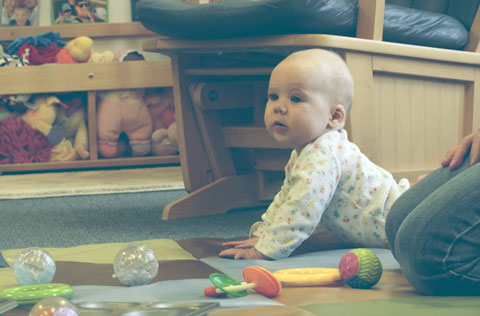About this Video
This Early Learning Moment provides an overview of the Physical Development and Health domain of the Illinois Early Learning Guidelines for Children Birth to Age 3. This section of the guidelines describes how infants and toddlers learn to move their bodies, take in their world through their senses, and carry out self-care routines. This section also explains how physical skills progress through development as young children’s bodies grow stronger and more able to move purposefully and with ease during everyday play and routines. Adults can encourage very young children to take part in self-care routines such as handwashing, dressing, and cleaning up toys to strengthen their growing bodies and promote age-appropriate independence.
Video
Setting Up for Success
In the video, we saw how very young children interact with their environment using their growing physical abilities and how adults caring for them are keeping them safe and healthy.
Subsections for Physical Development and Health
- Gross Motor
Children demonstrate strength, coordination, and controlled use of large muscles. - Fine Motor
Children demonstrate the ability to coordinate their small muscles in order to move and control objects. - Perceptual
Children demonstrate the ability to distinguish, process, and respond to sensory stimuli in their environment. - Self-Care
Children demonstrate the desire and ability to participate in and practice self-care routines.
Self-Assessment and Reflection
This video presented examples of how infants and toddlers explore and play by using their growing physical skills. We have seen examples of how daily routines provide opportunities to develop physical skills and healthy habits. Now, consider your interactions with children and how you can promote healthy habits and physical development. Here are some questions to consider:
Have you arranged spaces with:
- Appropriate furniture that very young children can use?
- Room for children to move and use large muscles safely?
- Areas that are easy to supervise all children as they move about?
- Anchored furniture, covered electrical outlets, secured window and electrical cords, and no small choking hazards?
Are you ready to:
- Help children safely explore using their large and small muscles?
- Provide encouragement when children are trying new skills?
- Provide comfort when children are frustrated or upset when they bump themselves or encounter obstacles?
- Allow children to make messes as they try personal care and health routines such as feeding themselves and washing hands?


